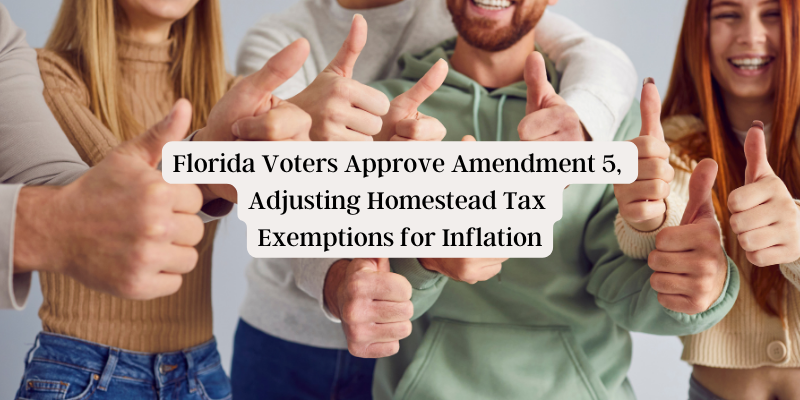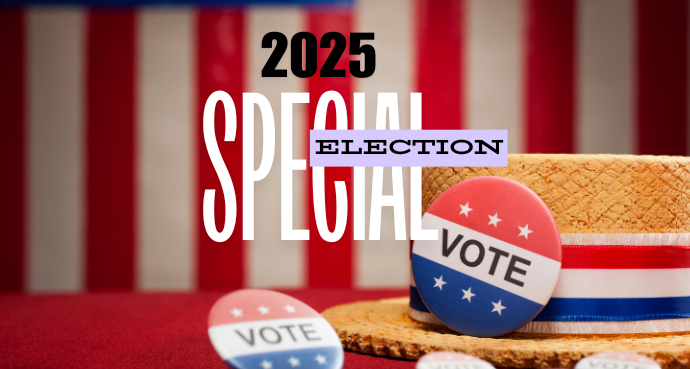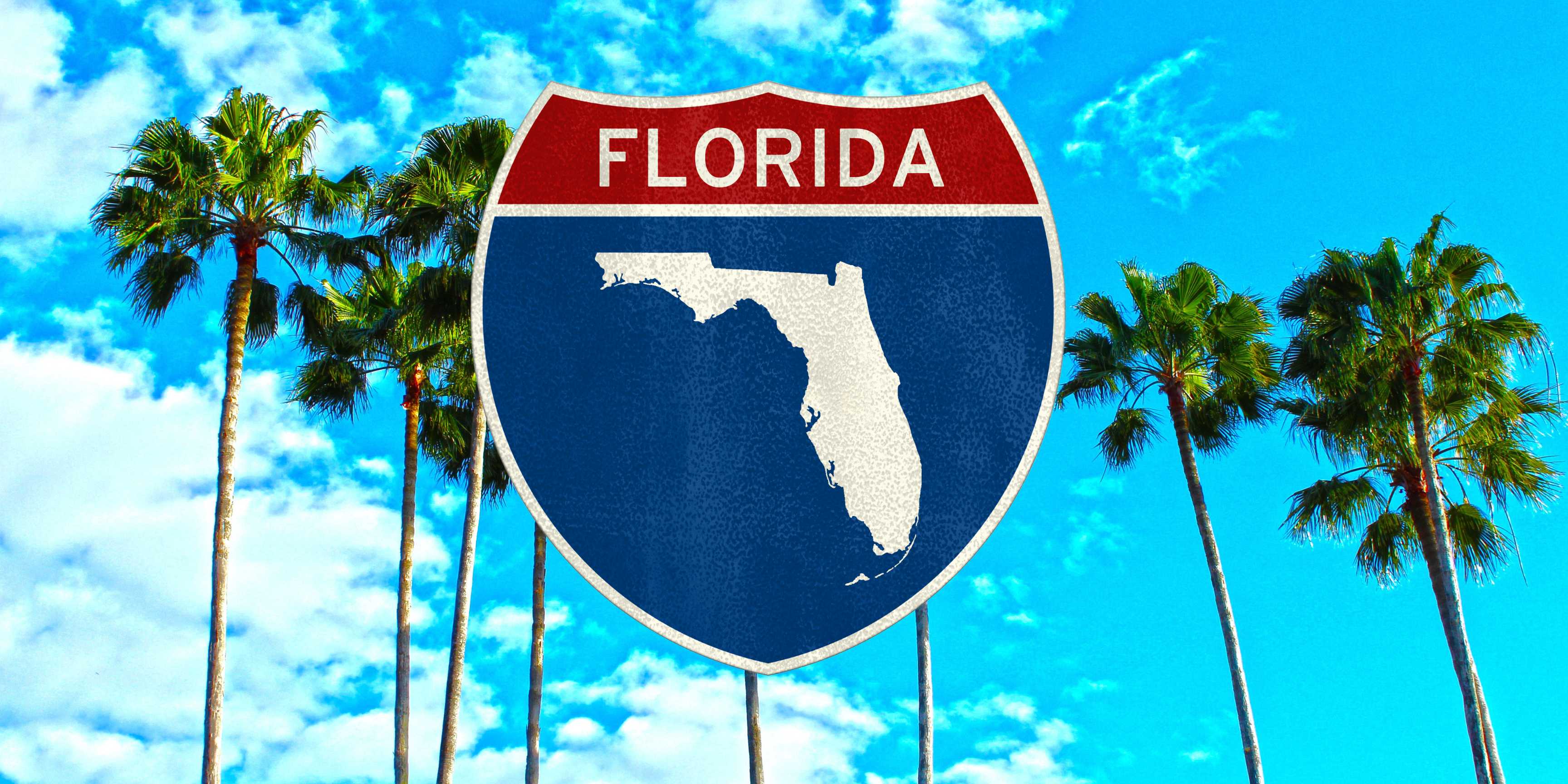2024 General Election: Florida Voters Approve Amendment 5, Adjusting Homestead Tax Exemptions for Inflation. What does this mean for Flagler County, Florida homeowners and other Florida Counties?
On November 5, 2024, Florida voters made their voices heard, with many rallying to the polls to express concerns about economic pressures and financial burdens. Over 66% of voters across Florida supported linking the homestead tax exemption to rising inflation, which has been among the highest in the nation.The amendment, proposed by the Legislature earlier this year, saw a division along party lines. With the passage of Amendment 5, which increases the homestead tax exemption to adjust for inflation, homeowners may see some relief starting in 2025—but this change could also lead to potential budget shortfalls for Flagler County in the future.
Amendment 5's Impact on Homeowners and Local Budgets:
The Florida homestead tax exemption will now include an inflation adjustment. Starting January 1, 2025, the portion of your primary home's value that is exempt from property taxes will rise each year based on inflation, helping the exemption keep pace with the cost of living..
For homeowners in Palm Coast and Flagler County, this means you could see gradual reductions in your property tax bill over time as inflation-adjusted exemptions help lower your taxable home value. This is a win for homeowners across Florida. However, keep in mind that this adjustment does not affect the portion of property taxes that goes toward school funding, so school budgets will remain unchanged by this amendment.
Budget Implications for Florida Counties:
Understanding this dynamic is important as it may influence local budget decisions and the future of public services. While this exemption adjustment benefits homeowners, it could lead to a decrease in property tax revenue for Flagler County and other Florida Counties. To offset the potential shortfall, the county will seek to explore how to make up for this shortfall by possibly increasing millage rates (a solution that will not sit well with Flagler County homeowners) or finding alternative revenue sources. This decision could directly impact the funding for essential local services, including emergency response, public parks, and recreational facilities.
Flagler County could consider a few alternative strategies to address potential budget shortfalls from reduced property tax revenue without raising millage rates. Here are some options that you can expect to hear about:
Economic Development and Growth Initiatives
- Attract New Businesses: By encouraging new businesses to set up in Flagler County, the area could benefit from an expanded tax base, generating more revenue without needing higher property taxes. Offering incentives for tech, retail, and service industries could be particularly beneficial.
- Tourism Promotion: Increasing tourism, especially in the scenic areas of Flagler Beach and Palm Coast, could bring more revenue through tourism-related taxes (hotel taxes, sales tax) and spur local business growth. While historicaly we've relied on little to few recourses, it may be an option to engage better with current local business to rally support.
Fee Adjustments for Select Services - It's time to pass the burden on.
- Impact Fees for New Developments: Increasing impact fees on new construction or development projects can ensure that growth helps fund the infrastructure it requires, easing the burden on existing taxpayers.
- User Fees for County Services: Rather than raising property taxes broadly, adjusting specific fees for services like parks, waste management, or specialized permits could help generate targeted revenue, of course this will not be a popular choice.
Sales Tax Adjustment
- Consider a Local Option Sales Tax: Flagler County could consider implementing or adjusting a local sales tax to fund specific county projects. This approach distributes the tax burden more widely, capturing revenue from tourists and non-residents who visit and shop in the area.
Enhanced Collection and Efficiency Measures
- Enforce and Streamline Tax Collection: Strengthening the collection of existing taxes, fines and permitting could reduce revenue loss. For instance, ensuring timely payments for property taxes, utility fees, and business licenses could stabilize cash flow, as well as enforcing property developers to pay upfront, not pay as you go.
- Operational Efficiency Reviews: Conducting audits to identify areas of inefficiency in county operations and making adjustments could free up funds by reducing expenses. This might include exploring energy efficiency, renegotiating contracts, or adopting cost-saving technology, maintenance cost and other budget eating resources that are ineffecient.
Grants and Federal Funding
- Seek State and Federal Grants as a Business Model: Applying for state or federal grants for infrastructure, environmental projects, or emergency services can reduce the reliance on local tax revenues. Flagler County might be eligible for specific funding through programs aimed at environmental preservation, storm resilience, or community development.
- Increase Disaster Resilience Grants: Given Florida's vulnerability to hurricanes, pursuing funding for storm preparedness and resilience could help fund necessary infrastructure improvements.
Special Assessments for Targeted Projects - Sharing is not always caring.
- Create Special Assessment Districts: For specific improvements, such as stormwater management or new sidewalks in certain neighborhoods, the county could create special assessment districts where residents who directly benefit from a project contribute to its cost.
While none of these options are ideal, exploring them can help Flagler County and other Florida Counties balance its budget and sustain local services without increasing millage rates, giving homeowners relief while maintaining community services.
We want to hear from you. Do you think this will truely effect budgets? What would you propose? Like and follow us for even more conversations you can be part of.






